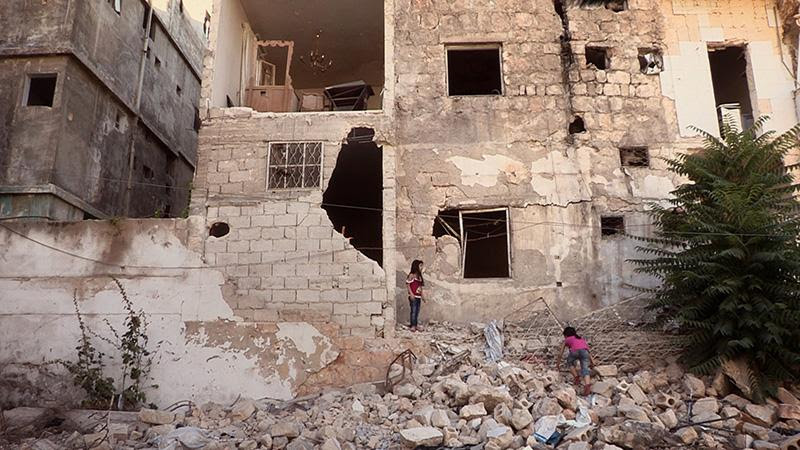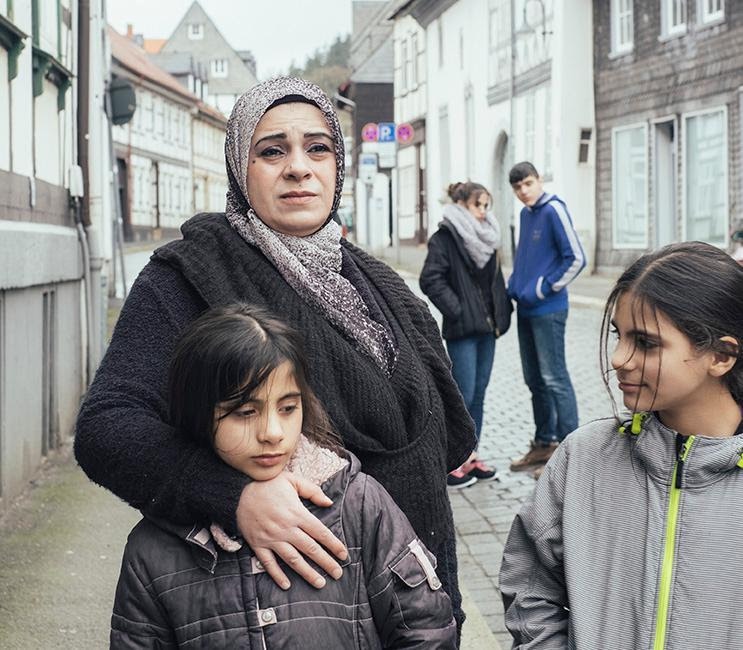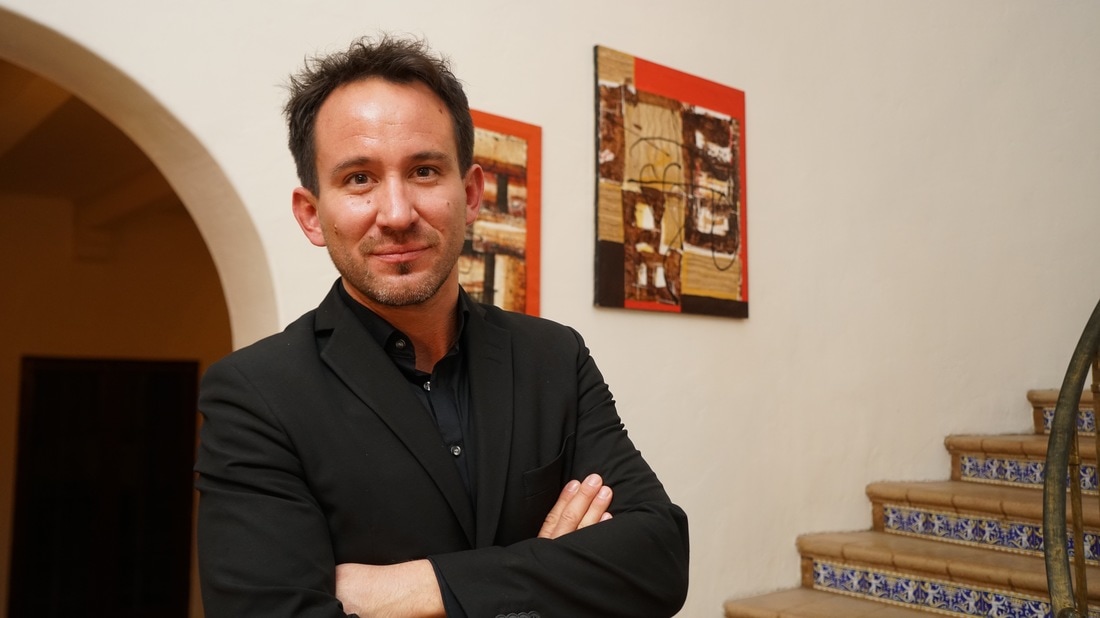|
Director Marcel Mettelsiefen: 'People in need are not choosing to leave. And if they would be able to choose they would rather stay.'
It is easy, from a distance, to demonize "the other" -- say, from the luxurious remove of Mar-a-Lago in Palm Beach, Florida, Donald Trump's "Winter White House."
It was from there on Friday that Trump dispatched this tweet:
It's pretty clear the "evil" the new president referenced is the threat he perceives from anyone traveling to the United States from seven majority-Muslim countries. The kind of people he banned from entering the U.S. by executive order -- an order temporarily halted by a federal judge. Fear-mongering and ethnic profiling operate most effectively in a vacuum of ignorance. When someone takes the time to understand the experience of Syrian refugees, for instance, it's much harder to dismiss them all as evil. This is the opportunity provided by Watani: My Homeland, the film directed by Marcel Mettelsiefen that is nominated for an Academy Award for best documentary short subject. It follows the family of Abu Ali, a commander in the Free Syrian Army, as they attempt to survive ferocious fighting in Aleppo and later are forced to flee to Germany. This family represents a tiny, tiny fraction of the millions who have been driven out of their homeland by the Syrian civil war. "What a good documentary would like to do is to break a complicated issue down into a microcosmos, and through the story of individuals give numbers a face and a voice," Mettelsiefen told Nonfictionfilm.com at a screening of his documentary at the German Consul General's home in Los Angeles in December.
Mettelsiefen says he has made over 25 trips to Syria since 2011. On one of those visits he first got to know Ali, his wife Hala and son Hammoudi and his three daughters. That Ali chose a Christian name (Helen) for one daughter, a Muslim name (Farah) for another and a Jewish name (Sara) for the third is one indication that this is not a family that falls neatly into any preconceived notion of 'scary' Muslims.
Indeed, Ali and his Free Syrian Army compatriots fought the brutal regime of Bashar al-Assad on the one hand, and on the other hand the Islamist forces of ISIS -- the latter group the one that has so ruinously influenced the perception of all Muslims as bloodthirsty and adamantly anti-Western. The Muslim world is not just evil.
Mettelsiefen says the temptation to conflate ISIS with all of Islam is "a narrative which needs a counter-narrative. The Muslim world is not just evil. And that's what she says, the mother [in Watani]. She says this particular group, the monster called Islamic State, destroyed the image of their religion and they have to suffer big time for what they've been doing."
In the midst of filming, Ali was kidnapped by ISIS, presumably never to be seen again. Increasingly vulnerable, Hala and her children were forced to flee Syria. They were resettled in a small town in Germany, an experience documented in the second half of Mettelsiefen's film. "The unique part of this film is that we were able to meet this family there where they belong, in Syria. We get to know them and we understand how difficult it is to leave everything behind," the director said.
The film contains human moments relatable to any audience -- the youngest children inventing ways to play even in the chaos of war; the anguish of Hala on the disappearance of her husband; the eldest girl Helen's tentative embrace of Western customs in Germany. The look on Farah's face as she adjusts to a new school with new classmates in a new country.
Under President Trump's executive order Syrian refugees like Hala and her children would be barred entry into the U.S. indefinitely. The proposed ban on travel from six other predominantly Muslim countries -- Iran, Iraq, Libya, Sudan, Somalia and Yemen -- would last 90 days while yet-to-be revealed "extreme vetting" procedures are implemented. Mettelsiefen said his film may resonate with Americans because of the nation's traditions, at least before Trump. "I think especially in the U.S. with having such a huge history of immigration, of being built basically through people who seek refuge out of different reasons -- hunger in Ireland, or persecution through the Nazis in the Second World War and so many other different reasons -- should perhaps be able through this film to identify and to understand in a way that people in need are not choosing to leave. And if they would be able to choose they would rather stay." The United States, under the Obama Administration, admitted several thousand Syrian refuges, compared to the hundreds of thousands that have resettled in Germany. "I do understand politicians, especially in times of elections, that they're more careful about how many people they do accept into their country," Mettelsiefen said. "But if we do believe in political responsibility to protect people in need then I think -- if you want take it from a Christian religious duty point of view -- [it's important] to give these people shelter, people who had to leave and to flee from a violent environment." He added, "I think we're getting into a world and a future where hate and social divide is shaping our future and we should be very much aware -- do we want to live in this kind of world? Or should we do something in order to make it better?"
Watani: My Homeland and the four other Oscar-nominated documentary shorts, along with the nominated live action and animated shorts, will be released theatrically in New York on Wednesday, February 8. The program will be released on 500 screens nationwide on Friday, February 10. More information on screening locations and times is available at shorts.tv.
|
AuthorMatthew Carey is a documentary filmmaker and journalist. His work has appeared on Deadline.com, CNN, CNN.com, TheWrap.com, NBCNews.com and in Documentary magazine. |
- Home
- News
- Videos
-
Galleries
- 2019 Tribeca Film Festival
- Full Frame Documentary Film Festival
- 2019 SXSW Film Festival
- SXSW 2018 Gallery
- 2019 Sundance Film Festival
- Outfest 2018 Photo Gallery
- Outfest 2017
- Sundance 2018 Photos
- 2017 LA Film Festival
- 2017 Cannes Film Festival
- Tribeca Film Festival 2017
- SXSW 2017 Gallery
- 2017 Berlin Film Festival
- Sundance 2017 Gallery
- 2016 Los Angeles Film Festival
- Cannes Film Festival 2016
- SXSW 2016 Gallery
- Berlinale 2016 Gallery
- Sundance 2016 Gallery
- Filmmaker Gallery
- About
- Contact
Proudly powered by Weebly
- Home
- News
- Videos
-
Galleries
- 2019 Tribeca Film Festival
- Full Frame Documentary Film Festival
- 2019 SXSW Film Festival
- SXSW 2018 Gallery
- 2019 Sundance Film Festival
- Outfest 2018 Photo Gallery
- Outfest 2017
- Sundance 2018 Photos
- 2017 LA Film Festival
- 2017 Cannes Film Festival
- Tribeca Film Festival 2017
- SXSW 2017 Gallery
- 2017 Berlin Film Festival
- Sundance 2017 Gallery
- 2016 Los Angeles Film Festival
- Cannes Film Festival 2016
- SXSW 2016 Gallery
- Berlinale 2016 Gallery
- Sundance 2016 Gallery
- Filmmaker Gallery
- About
- Contact




 RSS Feed
RSS Feed